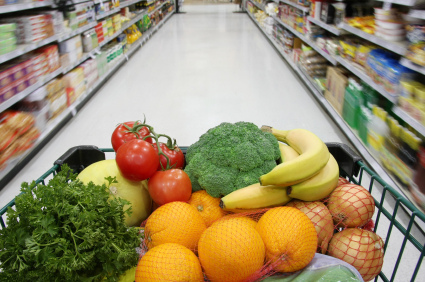
Do we eat junk food because there are so many sales and coupons for it? Or are there so many sales and coupons for junk food because we eat so much of it? A couple of recent studies suggest that we’d eat a lot healthier, if only we could get our hands on more coupons for healthier foods.
In a study published in the April edition of the American Journal of Clinical Nutrition, researchers in New Zealand found that shoppers who were given coupons for fruits and vegetables bought nine pounds more of it over a two-week period than they did before participating in the study. Those who were given nutrition advice and healthy cookbooks along with their coupons bought even more – 12 pounds’ worth of fruits and vegetables. A third set of shoppers got the cookbooks and nutritional education, but no coupons – and they didn’t change their buying habits at all.
The researchers conclude that education about eating healthy is important, but discounts are what make us take action. “Price changes are really needed,” lead researcher Wilma Waterlander told Reuters. “Many people argue that we should educate the population better about healthy eating. However, our results clearly show that that is not the direction to go.”
The study took place in the Netherlands, where Waterlander explains produce prices are particularly high. Farm subsidies in the United States keep produce prices here relatively low in comparison. Many Dutch grocery stores, Waterlander says, have slashed prices on less healthy, more popular, products to bring in customers – while keeping their produce prices high to make up for it.
A separate recent study in South Africa reached similar conclusions. Researchers, who published their work in the American Journal of Preventive Medicine, examined a health program in South Africa that offers cash-back rebates of up to 25% for healthy food purchases. They found that participants who received a 25% rebate bought significantly more healthy food – boosting their ratio of healthy to total food purchases by nearly 10%.
“This paper provides good evidence that lower prices for healthier foods significantly alter purchasing patterns,” researcher Roland Sturm said in a news release announcing the study.
The studies could help serve as a wakeup call to retailers and marketers who keep pushing us to buy unhealthy products. Consider how many coupons you’ve seen for candy and sugary cereal, compared with how many coupons you’ve seen for something that was actually grown and not manufactured. The studies also come on the heels of a report that found shoppers are actively seeking out deals on healthier food, by doing more of their fresh food shopping at lower-priced supercenters (read: “Shoppers Demand Cheap & Convenient Fresh Food”).
“It’s profitable for the bottom lines to promote the unhealthy options,” public health expert Karen Glanz of the University of Pennsylvania tells Reuters. That’s the convention wisdom, at least. But these new studies show it could be just as profitable to offer coupons and discounts on healthy foods, too. Ultimately, it could be a matter of changing marketers’ habits – in order to help change our own.











This makes total sense to me.
Perceived value is an important factor in the decision making process that takes place on the grocery store floor. (Why would that differ from any other shopping decision?)
I have often wondered if potato chip sales would suffer if the selling price were: ‘by the pound’ (like produce) as opposed to: ‘per each’. When you buy chips are you looking @ a 9oz bag for: 3.29? Or Tostitos tortilla chips for: 5.85/lb?
I have read lately that pre-packaged ‘convenience’ produce sales are doing very well. Why is that? It’s the same produce priced in a different manner-right?
Note: I read “The Packer” free on-line newsletter.
It’s all about fresh food/produce trends in sales, production, pricing, marketing etc….it’s very informative.
Take a look, I think you might enjoy it.
Thanks Barbee, The Packer is a great site!
🙂